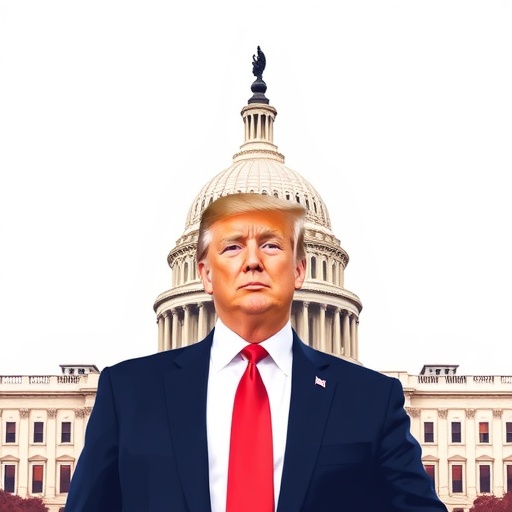US Government shutdown Ignites Fears Over Trump’s Assault on Congress’s Spending Power
In a dramatic escalation of executive authority, the ongoing US Government shutdown has plunged the nation into uncertainty, with critics accusing President Donald Trump of systematically undermining Congress’s constitutional spending power. As federal funding freezes critical services for millions, billions in taxpayer dollars hang in limbo, fueling a heated debate over the balance of power in Washington.
The shutdown, now entering its third week, stems from a bitter impasse over border wall funding, but its ramifications extend far beyond partisan squabbles. Legal experts and lawmakers warn that Trump’s unilateral actions—such as redirecting military funds without congressional approval—represent a dangerous precedent that could erode the legislative branch’s purse strings, enshrined in Article I of the Constitution.
Federal Funding Freeze Hits Essential Services Hard
The immediate fallout from the Government shutdown is stark: over 800,000 federal workers are furloughed or working without pay, and services from national parks to air traffic control are severely compromised. According to the Congressional Budget Office, the shutdown has already cost the economy an estimated $11 billion in the first two weeks alone, with projections soaring higher as the stalemate persists.
Consider the human impact. In Yellowstone National Park, rangers are absent, leaving visitors to navigate trails without guidance amid heightened wildfire risks. At the IRS, tax processing has ground to a halt, delaying refunds for hardworking Americans filing their 2018 returns. “This isn’t just about politics; it’s about people losing their livelihoods,” said Sen. Chuck Schumer (D-NY) in a floor speech last week. “The federal funding cutoff is starving communities of the resources they need to thrive.”
Statistics paint a grim picture. The Partnership for Public Service reports that 70% of affected employees are essential workers required to report without compensation, including border patrol agents and food safety inspectors. In agriculture, USDA loans for farmers—vital in Trump’s rural base—are stalled, potentially leading to $1.5 billion in lost productivity, per the American Farm Bureau Federation.
Moreover, the shutdown exacerbates existing inequalities. Low-income families relying on Head Start programs for early childhood education find doors closed, with 34,000 children affected nationwide. Veterans’ benefits, while partially protected, face delays in processing, drawing ire from groups like the Veterans of Foreign Wars. “Our heroes deserve better than bureaucratic chaos,” VFW National Commander Vincent Smooth stated in a press release.
Trump’s Executive Actions Spark Constitutional Firestorm
At the heart of the crisis is President Trump’s aggressive use of executive power, which many see as a direct challenge to Congress‘s spending power. In a bold move, Trump declared a national emergency to reallocate $8 billion from the Pentagon’s budget toward his border wall, bypassing lawmakers who refused to approve the funds in a December spending bill.
This isn’t isolated. Throughout his term, Trump has issued over 100 executive orders related to budgeting, including impoundments of congressionally approved funds for Ukraine aid and domestic programs. Constitutional scholars like Bruce Ackerman of Yale Law School argue this pattern violates the Impoundment Control Act of 1974, designed to prevent presidents from withholding appropriated money. “Trump is testing the limits of Article II, but at what cost to our democracy?” Ackerman wrote in a recent op-ed for The New York Times.
Historical context underscores the gravity. The last major shutdown in 2018-2019, also under Trump, lasted 35 days and cost $18 billion. Yet this iteration feels more existential, with Trump’s team openly discussing further reallocations. White House Press Secretary Kayleigh McEnany defended the actions, saying, “The President is using every tool at his disposal to secure our borders, as Congress has failed to act.”
Critics, including former Attorney General Eric Holder, decry it as authoritarian overreach. In a CNN interview, Holder noted, “The framers intended Congress to control the purse to check the executive. Trump’s maneuvers flip that on its head, inviting future presidents to ignore the legislative branch.” Bipartisan concern is mounting; even some Republicans, like Sen. Mitt Romney (R-UT), have expressed unease, tweeting, “Emergency powers should be for true emergencies, not policy disputes.”
Lawmakers Mobilize to Reclaim Spending Authority
In response to the government shutdown, Congress is mounting a fierce defense of its spending power. House Democrats, led by Speaker Nancy Pelosi, passed a resolution last Thursday condemning Trump’s emergency declaration and vowing legal challenges. The measure, which cleared on a 245-182 vote, calls for immediate restoration of federal funding and an investigation into executive overreach.
Senate Majority Leader Mitch McConnell faces pressure from within his caucus to act. A group of 15 moderate Republicans has urged him to bring a clean continuing resolution (CR) to the floor, which would fund the government through March without wall provisions. “We can’t let one branch dictate to another,” said Sen. Susan Collins (R-ME) in a statement. Polls reflect public sentiment: a Quinnipiac University survey shows 54% of Americans blame Trump for the shutdown, with approval for his handling at a dismal 35%.
Legal avenues are also opening. The ACLU and several states, including California and New York, have filed lawsuits arguing that Trump’s fund diversions violate the Appropriations Clause. U.S. District Judge Haywood Gilliam, in a preliminary ruling on a related case, expressed skepticism toward the administration’s claims, stating, “Congress’s role in spending is not optional.”
Behind the scenes, negotiations intensify. Bipartisan talks in the Senate aim to craft a compromise bill that includes $1.375 billion for border security—short of Trump’s $5.7 billion demand—but with concessions on immigration reform. Rep. Will Hurd (R-TX), a retiring moderate, warned, “If we don’t resolve this, the damage to our institutions could last generations.”
Advocacy groups are amplifying the call. The Campaign Legal Center has launched a petition drive, gathering over 500,000 signatures urging Congress to assert its authority. Meanwhile, think tanks like the Brookings Institution release reports detailing how repeated shutdowns erode trust in government, with one study estimating a 10% drop in public confidence since 2013.
Economic and Social Toll Mounts Amid Stalemate
Beyond Washington, the government shutdown is unleashing widespread economic pain, intertwined with fears over eroded spending power. Small businesses near federal installations report 20-30% revenue dips, according to the National Federation of Independent Business. In Washington, D.C., alone, local governments project a $200 million shortfall from reduced tourism and contractor payments.
The ripple effects hit vulnerable populations hardest. SNAP benefits for 40 million low-income Americans risk interruption if the shutdown extends, per USDA estimates. Housing assistance programs under HUD are frozen, leaving 4.5 million families in jeopardy. Economists at the Federal Reserve warn of broader consequences: a prolonged shutdown could shave 0.5% off GDP growth in Q1 2020, potentially tipping the economy into recession amid trade tensions.
Trump’s base isn’t immune. In red states like Texas and Arizona, furloughed Customs and Border Protection officers—many Trump supporters—are struggling. One agent, speaking anonymously to NPR, shared, “I’m proud to serve, but not getting paid while politicians bicker? It’s infuriating.” Food banks report a 15% surge in demand, straining resources already thin from prior budget cuts.
Internationally, the shutdown undermines U.S. credibility. Allies question America’s stability, with EU diplomats privately expressing concern over delayed foreign aid commitments totaling $4 billion. The World Bank has noted potential disruptions to global health initiatives funded by USAID, affecting anti-malaria efforts in Africa.
Path Forward: Bipartisan Reforms to Safeguard Spending Power
As the crisis deepens, eyes turn to potential resolutions and long-term fixes. Short-term, a deal could emerge if Trump softens on wall funding, perhaps accepting technological alternatives like sensors and drones, as proposed in a Senate amendment. House Republicans have signaled willingness to support a CR if paired with DACA protections, bridging divides.
Looking ahead, lawmakers are eyeing structural reforms to prevent future encroachments on Congress‘s spending power. Bills like the ARTICLE ONE Act, introduced by Sen. Chris Murphy (D-CT), would require congressional approval for emergency fund shifts. The Bipartisan Budget Act of 2019 includes provisions for automatic CRs during impasses, aiming to avert shutdowns.
Experts predict court battles will define the era. The Supreme Court, with its 6-3 conservative majority, may ultimately weigh in, potentially affirming or curbing executive latitude. Justice Ruth Bader Ginsburg, in past dissents, has championed legislative primacy, hinting at possible divisions.
Ultimately, restoring balance requires political will. As Trump tweets defiance—”Congress must fund the Wall!”—bipartisan voices like former President George W. Bush call for unity: “Our system thrives on compromise, not confrontation.” If history is a guide, from the 1995-96 shutdowns under Clinton to recent ones, resolutions come at a cost—but they reinforce democratic norms. The question remains: will this government shutdown catalyze meaningful change, or deepen the divide over federal funding and power?
With negotiations resuming Monday, stakeholders urge swift action. The stakes—economic stability, constitutional integrity, and public trust—couldn’t be higher.








